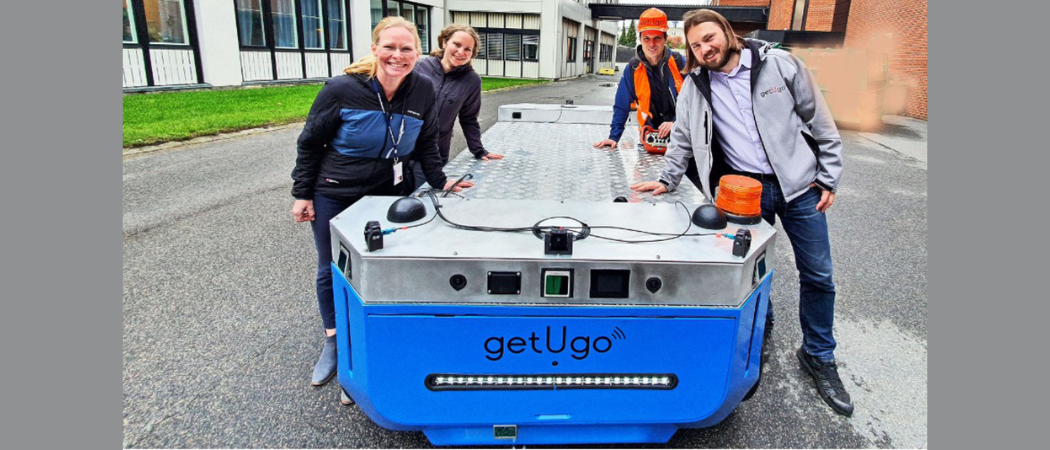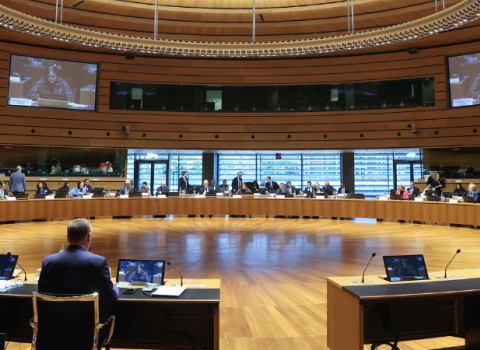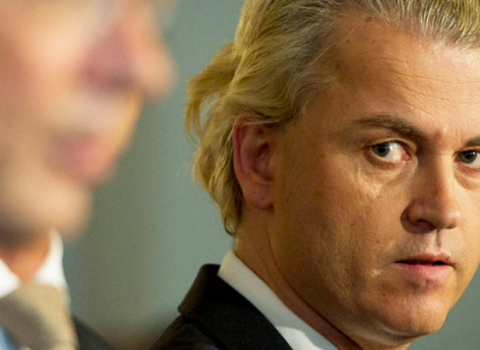The EEA and Norway Grants have carved out a niche supporting start-ups from the Widening countries that are looking for international collaboration and green prestige

Testing teleoperation of autonomous vehicles with an EEA and Norway Grant: from the left, Tove Sørensen of Herøya Industripark, Rebecca Ronke from Applied Autonomy, and Matiss Stunda and Janis Upmanis from getUgo. Photo: Siri Krohn-Fagervoll
The mechanism by which Iceland, Liechtenstein and Norway contribute to economic and social cohesion in the EU is nearing the end of its current funding period. With negotiations for what follows still under way, the initiative is beginning to take stock of its achievements, including support for innovation and start-ups in Central and Eastern Europe.
Called the EEA and Norway Grants, the mechanism runs parallel to the EU’s cohesion spending, with five priorities that are in line with the EU’s Europe 2020 strategy. Within this broad palette of spending, support for start-ups is concentrated in a programme on business development, innovation and SMEs, within the priority on innovation, research, education and competitiveness.
The present funding period covers 2014-21, although with implementation trailing the release of funds projects will continue running into 2024. To date, 840 SMEs have been supported through this programme, of which 47 are start-ups.
Yet despite its alignment with EU programmes, the EEA and Norway Grants have a distinct flavour of their own when it comes to supporting innovation. In particular, the involvement of partners from the three contributing countries is encouraged, wherever possible.
“They don’t contribute with money but with expertise, and they also learn from the exchange,” said Eva Honningsvåg, head of communication for the EEA and Norway Grants Financial Mechanism Office (FMO) in Brussels.
In the business innovation programme, these partners can include companies, universities or public sector bodies, for example, and the formation of new bilateral partnerships is supported with activities such as business matchmaking. “Cooperation between the countries is one of the main objectives of the grants, in addition to reducing economic and social disparities,” said Honningsvåg.
Another requirement is that the projects are expected to meet sustainability targets. “The activity supported can be the development or implementation of a new product, technology or service, but it should be done sustainably,” said Margrethe Asserson, the FMO programme manager for business development, innovation and SMEs.
To this end, each project is assessed with a series of green indicators, such as emissions reduced, or the contribution it makes to building a circular economy. Finally, each innovation project has a competitiveness objective.
“The idea is to support the development of the knowledge economy, to contribute to the green transition, and at the same time to support solutions that contribute to the growth of the company and the economy,” Asserson said.
Beneficiary countries
This business development, innovation and SMEs programme is implemented in 10 EU countries: Bulgaria, Croatia, Estonia, Greece, Latvia, Lithuania, Poland, Portugal, Romania and Slovakia. Hungary was to be included, but a dispute in 2021 about implementation of grants for civil society actions resulted in a freeze on all project funding though this mechanism.
Grants are issued in four broad areas of activity: green industry innovation; blue growth, which is broadly the development of the marine and maritime economy; information and communications technology; and welfare technology and ambient assisted living. According to the 2022 status report on the EEA and Norway Grants, published in June, these programmes amount to a total of €322 million.
The national programmes are administered by partner organisations in the beneficiary countries, which issue open calls for proposals. The funding typically covers half of the project cost, with the rest coming from national funding schemes and the applicant’s own resources.
In each country, efforts are made to position the funding so that it complements other sources of support. “When we develop the programmes, we are looking at funding gaps in the market, and where we can come in and be relevant,” said Asserson. “Together with the national partners we cooperate to find relevant support.”
This role is also shaped by the size for the grants, which tend to be more modest than those available through EU funds. “Our projects might be a bit smaller and simpler, and perhaps they act as a stepping stone to larger EU-funded projects,” said Asserson. “It can also be a way for a business to start cooperating internationally, or to gain experience managing a publicly funded project.”
Searching for partners
Latvian start-up getUgo was attracted to the EEA and Norway grants as a source of funding to further develop its technology, without having to giving away equity. Founded in 2020, the company has devised a teleoperation system that allows vehicles to be driven remotely. Possible applications include providing a back-up for autonomous vehicles when they need to negotiate unforeseen road conditions, doorstep delivery of shared vehicles, and a range of uses in logistics.
A search for possible partners in Norway led getUgo to Applied Autonomy in Kongsberg, a specialist in environments for autonomous transport. This company in turn introduced a third partner, Herøya Industripark, and a test case for getUgo’s technology to complement the use of autonomous vehicles.
When a truck arrives at a large industrial park with goods for a resident warehouse or factory, it is typically guided from the gate to its destination by someone driving a pilot vehicle. Autonomous vehicles are being developed to take over this routine task, but automating all possible routes though a large park would be prohibitively expensive.
Using the Norway Grant, GetUgo coordinated a project to test the use of an autonomous vehicle with teleoperations as a back-up, working in combination with a route and journey dispatch system.
The year-long project, with initial funding of €130,000, involved integrating getUgo’s technology with an autonomous vehicle provided by a third party. It was tested at Herøya Industripark in the south of Norway, with getUgo’s teleoperator working from the company’s office in Riga.
“We managed to control the vehicle from almost 1,000 kilometres away, with good video quality and low video latency, which allowed us to drive safely at 35-40km per hour,” said Janis Upmanis, co-founder and chief executive of getUgo.
From a technical point of view the project was a success, and good for the company. “It helped us develop our general technology, and there was also a benefit in learning more about how we can integrate our technology with a specific vehicle,” Upmanis said.
But the business outcome is more ambiguous. “We were interested in putting our product together with other technologies in a new concept, which we had not thought of before, and hoped that this could be a future product for us,” Upmanis said.
However, the fact that so many partners were involved appears to be a barrier in taking the idea further. “Since we cannot offer a park like Herøya the whole system, this may not be a product for us after all,” he said.
GetUgo’s experience with the Norway grant has been mixed. One of the positives was that the funding was easily accessible for a such a young company. This contrasts with another scheme it looked into, the Interreg Estonia-Latvia Programme, which bases eligibility and funding on a company’s historic turnover. So, for an application this year, getUgo would be judged on its turnover in 2021. “We set up in late 2020, so in 2021 we had very little turnover, and not enough to reach the minimum for eligibility,” Upmanis said.
Negatives included an overly bureaucratic application process, which had to be completed in two languages: collaboration between the partners was in English, while the local office worked in Latvian. It was also clear that the administration was not ready for an application involving more than one Norwegian partner. “This made the whole process more complex for us,” Upmanis said.
Insect bioconversion
Bulgarian company Nasekomo was attracted by green credentials of the EEA and Norway grants, which have a high profile locally for supporting projects with high standards in sustainability. “It was one of the first funding mechanisms here to speak about the green economy,” said Maria Alexandrova, Nasekomo’s head of innovation projects and sustainability. “This has been a very important influence on our region.”
She credits the scheme with shaping local funding, for example with the introduction of green impact indicators which are now widely used in national operational programmes and calls, and encouragement for partnerships.
Nasekomo was founded in Sofia 2017 to enter the nascent market of insect proteins for animal feed and agriculture. It has since evolved into a biotech company, developing automated and AI-based solutions for scaling up insect farming.
The company works with the black soldier fly, whose larvae are highly effective at transforming low-value biomass from the agri-industries into high quality protein with a beneficial micronutrient profile, process known as insect bioconversion. The larvae can be processed into animal feeds, substituting for imported soy and fishmeal, while the residue from their growth – called frass – can be used as a fertiliser.
In order to scale up its core business, Nasekomo has developed a range of technologies to automate the insect rearing process, and in recent years it has opened up its proprietary technologies to other insect protein producers.
The project supported by the Norway grant takes this a step further, and develops key-enabling technologies to support decentralised insect bioconversion at scale. “We want to put insect bioconversion close to the low-value input streams and help agri-industrial companies manage the lifecycle of the insect, so that we can produce sustainable insect protein all over Europe,” said Alexandrova.
With initial funding of €345,000, the project began in July 2021 and is expected to run until December 2023. Given the level of innovation involved, Nasekomo preferred to carry out the project alone rather than involve a Norwegian partner.
“We will come up with the concept, the design and implementation of entire industrial lines,” Alexandrova said, adding that the aim is to file two patents as a result of the project. “In this situation, the R&D and creativity is so high that it is very difficult to identify a partner that can supply us with a standard technology or service.”
Alongside the funding, the prestige and visibility that comes with winning the grant was an additional benefit. “The programme insists on green impact, and promotes these results, for example with the video material about the projects that is published in the Norway grants portal,” said Alexandrova.
It also brings a level of project discipline that she finds useful. “Without someone checking, that kind of activity can slip, so it has been good for structuring our processes and keeping a tight pace.”
Meanwhile, the support for the project at Nasekomo is having an impact in the broader community of companies the company works with, for example on automation. “Before working with us, these companies had limited insight on insect farming, but now they see the insect industry as a new business case, and how the sustainable impact that we are looking for can happen through their technologies,” Alexandrova said. “So, it is interesting how funding such as this can help the entire innovation ecosystem to develop.”
Elsewhere in the Ecosystem…
- The European Investment Fund has committed €25 million to Radix Ventures, a deep-tech investor with a focus on Central and Eastern Europe. The company is the brainchild of Paweł Bochniarz, Wojciech Ratymirski and Michał Urbanowski, who together managed Valuetech Seed, one of Poland’s most successful early-stage deep tech funds. In this new venture, they are joined by tech investors from Romania, Hungary and Ukraine. Radix Ventures aims to raise at least €50 million in total, with a hard cap of €70 million.
- EU efforts to stimulate innovation in the circular economy have misfired, according to a report from the European Court of Auditors. Between 2016 and 2020, more than €10 billion was earmarked for investment in green innovation and to help businesses transition to a circular economy. “However, the member states spent the vast majority of this money on managing waste rather than on preventing it through circular design, which probably would have had more impact,” the report says.
- The European Patent Office (EPO) and the European Innovation Council (EIC) are to strengthen operational ties, following a pilot project that began at the end of 2022. A new collaboration agreement will include education and training activities for EIC staff and beneficiaries, with a view to improving patent valorisation and commercialisation by researchers and businesses. The EPO will also help EIC evaluators to identify projects with the highest potential for impact based on technological novelty, inventive merit and proposed future strategy.





 A unique international forum for public research organisations and companies to connect their external engagement with strategic interests around their R&D system.
A unique international forum for public research organisations and companies to connect their external engagement with strategic interests around their R&D system.